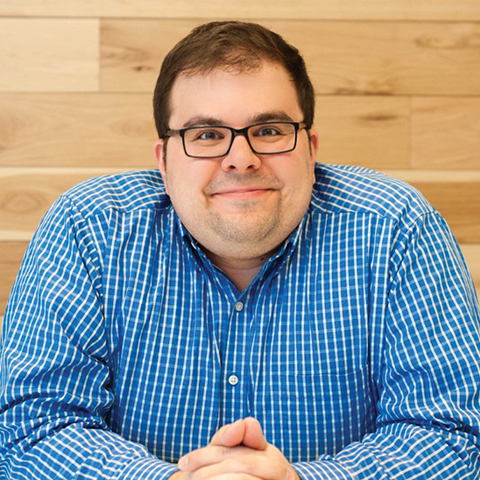How did you break into the events industry?
I was doing production for an advertising agency for a little while, and then I went freelance. The first company I worked with freelance was Jack Martin Productions. I became a production assistant, and then a coordinator, and then a producer. Then Chris and I got married and opened up our own company. We thought if we can do good work for other people, let’s do it for ourselves. And we saw things we didn’t like, particularly in production and how people were treated, so we wanted a company with a mindset and culture where people knew they were appreciated.
Is being an independent meeting and event professional for everyone?
It depends where you are in your career and who you are as a person. When I started out being a freelancer, it gave me an opportunity to see how different companies did things, how they worked, and also how I wanted to do it and how I didn’t want to do it. I’m flexible in the way I work, and it was great right out of school to have that opportunity. I enjoyed being a freelancer, but some people need to know where they’re going to be each day, 365 days a year.
Do you enjoy working for yourself?
Chris and I love having our own company. He is the CCO and I’m the CEO; we split responsibilities. It’s interesting to be a married couple for 31 years, and also working together for 31 years. There is a supportive atmosphere that’s here and it’s important. Having our own company gives us the ability to really consider opportunities that come our way: Are we the best ones for the job? Do we want to do this job? Opportunities arise that are not within our value set, and we have to take that into consideration. Plus, Chris and I love working together, and we also have the opportunity to bring in amazing people and pick and choose who we want to work with.
What are the pros and cons of owning and operating your own business?
I think that it’s really difficult for company owners to keep space and staff the way they used to. It’s a huge commitment, especially since 2008, with the collapse of the economy. We used to have the opportunity to budget our jobs in a way so that as a company, more money went toward research and development and to keeping people on staff. It’s so much more difficult to do that today. It’s not as easy on the supplier end of this industry. But the upside is we all think differently and more creatively because of it. We work more collaboratively with clients, so we don’t spend money on things we won’t use later. It’s actually a really exciting development.
What were some challenges you faced early in your career?
If you’re good at a job, this is truer today than it was when I was starting out, if you’re good, people will want to keep you there, making it difficult to grow. When I was starting out, people did everything. We had the opportunity to do and try everything. It made people multifaceted. Today people are much more specialized, which makes it difficult to grow in our industry.
What advice would you give to professionals just starting out in the industry?
Expose yourself to our entire industry and all it has to offer. Listen closely and see what all the different parts are, and at some point try and do something in all of the areas, so you understand what it takes. I think it’s really important to understand the big picture of what it takes to create an event. So, listen and watch and be engaged.
When you’ve finished your responsibility, see if you can help someone else; never sit idle. Usually someone else could use some help, and you may find there’s an area that you end up loving more. We have a great opportunity to get our hands dirty in a lot of other areas in our industry, and that makes it fun, interesting, and engaging.
Also, really know what’s going on in the world today, because there’s so much that’s going on that we can bring to our events to make them relevant. So be on top of what’s out there and what’s coming down the pipeline.
What are some paramount moments in your career?
Opening our own company was phenomenal. There are those “aha” moments when you’re starting out, where you think, “Oh, I know what I’m doing here,” and you progress on to the next level, and that makes it exciting. I know when I produced my first show, that was really exciting for me. I remember walking into a new company as a freelancer and I’d feel confident about myself, and then companies started to call me. While the biggest success was the day we opened our company, there are those landmark anniversaries, and when you land that big client and they come back, those are great moments.
How have you overcome challenges throughout your career?
One thing we’ve found is when there are challenges, like when the economy tanked, it makes you more creative. It pulls people together. You get together with your team and work things out. It strengthens your culture even more, and promotes ideation sessions and a more collaborative process. We promote change, not just for change’s sake, but to make you better and put out better, more meaningful work. With all the challenges we’re thrown, we end up being better for it. It’s hard work, but it’s rewarding.
What is your favorite part of working in live meetings and events?
They’re really exciting. It’s great to be able to bring people together, and to inform, and to help form relationships. It’s important that our clients know it’s about the attendees and not about them. We’re creating opportunities for learning, so people can succeed at their jobs. These events are not only fun but also important, because relationships help in business. You want to show appreciation, have intensive learning experiences, and form these relationships.
It’s fun to bring 12,000 or 18,000 or even just 100 people together and make an engaging event. But it’s how you do it, build the meeting, and why you do it, what the end result is, that makes it interesting for us. That’s the challenging part.
For more information: drurydesign.com
Sidebar: Interdependents
What do you get when you put 24 independent planners — essentially competitors — in a room? No, this isn’t the premise for a new reality show. When PCMA’s Independent Planner Think Tank got under way in New Orleans a few months ago, it was in the spirit that a rising tide lifts all boats — and every participant was on board with that. Read Convene ’s blog post on the Think Tank and watch two short video interviews from the event at convn.org/IP-think-tank .


